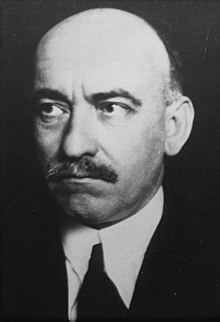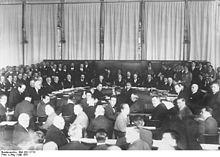Vojislav Marinković
Vojislav Marinković ( Serbian : Војислав Маринковић ; * May 13, 1876 in Belgrade ; † September 18, 1935 ibid) was a Serbian politician who was Foreign Minister for several years and Prime Minister of the Kingdom of Yugoslavia for three months in 1932 .
Life
Marinković completed a degree in law and economics at the University of Paris and graduated with a doctorate . He then entered the public service in 1901 as an employee of the Ministry of Finance.
In 1906 he was elected as a progressive member of the Parliament of the Kingdom of Serbia , before he was elected member of the National Assembly of Yugoslavia in 1921 after the establishment of the Kingdom of Yugoslavia and was a member of this until May 1935.
In 1913 he represented Serbia in the negotiations to end the First Balkan War and in 1914 was appointed Minister for National Economy in the Government of Serbia, of which he was a member until 1917. After he had become leader of the Progressives in 1915, he participated in the drafting of the Corfu Declaration of July 20, 1917 establishing a common state of Slovenes, Croats and Serbs on October 29, 1918, from which on December 1, 1918 the Kingdom of Yugoslavia called Kingdom of Serbs, Croats and Slovenes emerged.
In 1919 Marinković became Yugoslavia's first trade minister and merged his Progressive Party with the second largest political party in the new state, the Democratic Party. In his function as Minister of the Interior between 1921 and 1922 in the government of Prime Minister Nikola Pašić , he initiated the organization of the right to vote . In 1924 he was foreign minister for the first time as the successor to Momčilo Ninčić , who replaced him a short time later.
In 1927 he was again foreign minister of Prime Minister Velimir Vukićević as successor to Ninko Perić and held this office until he was replaced by Bogoljub Jevtić in 1932. During this time, he first signed a friendship treaty with France in 1927 and ratified the 1925 Nettuno Convention , which the economic and cultural relations with Italy improved.
He was also the representative of Yugoslavia in the League of Nations Assembly and between 1929 and 1932 a member of the League Council and its President in 1930.
At the League of Nations assembly in Geneva in May 1931 , he spoke out so vigorously against the formation of a customs union by Austria and Germany that Austria ultimately disavowed the signing of this agreement.
On April 4, 1932, Marinković succeeded Petar Živković as Prime Minister of Yugoslavia and held this office for almost three months until he was replaced by Milan Srškić on July 3, 1932.
As such, he also took part in the negotiations for the establishment of the Balkan Entente , a military alliance between several Balkan countries that was concluded on February 9, 1934 for seven years after the end of his term in office . Contracting states were Turkey , Greece , Romania and Yugoslavia. During this time he was also a participant in the negotiations for the new statutes of the Little Entente.
After the assassination of King Alexander I on October 9, 1934 in Marseille , at the request of Prince Regent Paul of Yugoslavia , he finally entered the government of Prime Minister Nikola Uzunović as a minister without portfolio .
literature
- Andreas Moritsch: Marinković, Vojislav . In: Biographical Lexicon on the History of Southeast Europe . Volume 3. Munich 1979, p. 101 f.
Web links
- Short biography (rulers.org)
- List of Foreign Ministers of Yugoslavia (rulers.org)
- Prime Minister of Yugoslavia (rulers.org)
| personal data | |
|---|---|
| SURNAME | Marinković, Vojislav |
| ALTERNATIVE NAMES | Маринковић, Војислав (Serbian) |
| BRIEF DESCRIPTION | Yugoslav politician |
| DATE OF BIRTH | May 13, 1876 |
| PLACE OF BIRTH | Belgrade |
| DATE OF DEATH | September 18, 1935 |
| Place of death | Belgrade |

